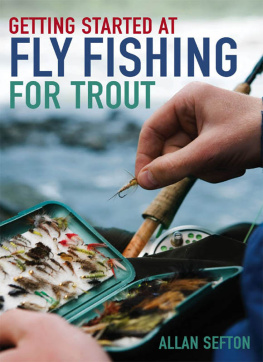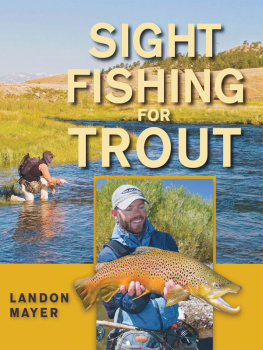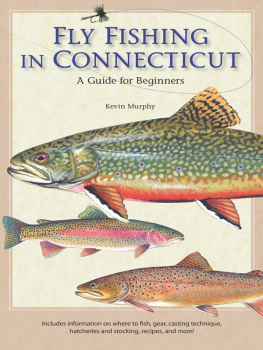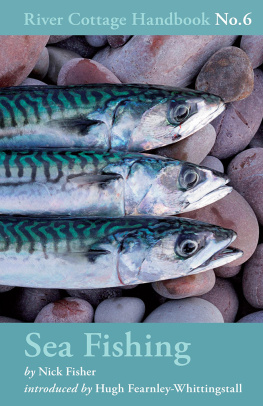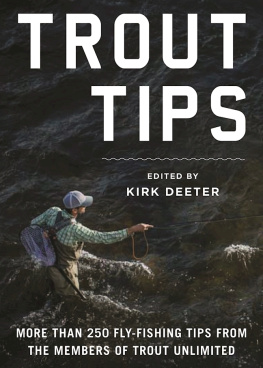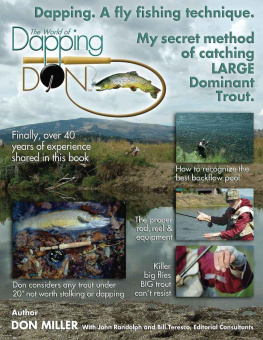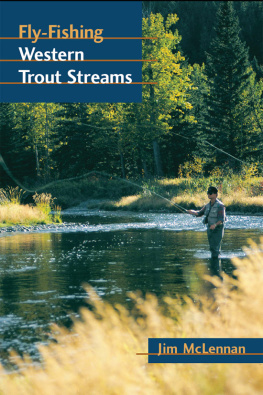GETTING STARTED
AT FLY FISHING
FOR TROUT
Also in Right Way
Begin Fishing the Right Way
Freshwater Fishing Properly Explained
Sea Fishing Properly Explained
GETTING STARTED AT FLY FISHING FOR TROUT
Allan Sefton

Constable & Robinson Ltd
5556 Russell Square
London
WC1B 4HP
www.constablerobinson.com
First published by Right Way, an imprint of Constable & Robinson, 2013
Copyright Allan Sefton 2013
The right of Allan Sefton to be identified as the author of this work has been asserted by him in accordance with the Copyright, Designs & Patents Act 1988.
All rights reserved. This book is sold subject to the condition that it shall not, by way of trade or otherwise, be lent, re-sold, hired out or otherwise circulated in any form of binding or cover other than that in which it is published and without a similar condition including this condition being imposed on the subsequent purchaser.
A copy of the British Library Cataloguing in Publication Data
is available from the British Library
ISBN: 978-0-7160-2288-6
eISBN: 978-0-7160-2289-3
Printed and bound in the EU
1 3 5 7 9 10 8 6 4 2
Cover image: Getty Images; Cover design: www.simonlevyassociates.co.uk
CONTENTS
ILLUSTRATIONS BY JIM WILDE
FOREWORD
BY DAVID E MOORE
What a perfect time to publish an excellent and comprehensive guide to taking up fly fishing!
Angling appeals to all ages, a truly cradle to grave sport which has so many facets, both mental and physical. Recent market research has shown that five million people in the UK are interested in taking up angling and recent developments have heralded a transformation into a more professional approach to coaching in this sport.
Historically, most of us were introduced to angling through family or friends and although still true today there is an increasing number whose first experience is through taster days under the guidance of a coach who has been trained and licensed by the Angling Trust.
Prior to 2007 there was a confusing range of angling instructor and coaching qualifications with little co-ordination across the three separate governing bodies for coarse, sea and game angling. In addition there were the Professional Anglers Association, mostly coarse anglers, and the Game Angling Instructors Association both trying hard to raise standards of tuition but using different criteria.
The breakthrough came with the formation of the Angling Development Board, a combined initiative from the three branches of the sport and supported by Sport England and the Environment Agency. This coincided with my retirement as Recreation and Access Manager for Anglian Water and I had the honour of chairing the ADB until its merger with the Angling Trust five years later.
The ADB needed a fresh approach for angling. Led by the experience and drive of Jackie Sheldon, previously Womens Coach of the Year as coach to the England Womens Rugby League team which won the World Championship in Australia, we took up the challenge of converting angling coaching into a single nationally accredited scheme of training, qualifications and licensing comparable with that of other sports.
Now, under the management of the Angling Trust, anyone learning to fly fish with a licensed Level 2 Coach can be confident of the same professionalism as they would expect from an equivalent coach at a tennis or swimming club and young or vulnerable people can expect the same standards of protection and safety. Our achievement was recognized by the UK Coaching Council as a benchmark of good practice for other sports.
Fly fishing can seem a daunting challenge with its emphasis on casting and the plethora of technical elements for describing something as fundamental as a line or one of the infinite number of flies. This is where a straightforward guide can de-bunk frightening complexity into a simple explanation which adds to the fascination of the sport.
Allan Sefton is an excellent example of the new generation of Angling Trusts qualified and licensed coaches. An experienced and successful angler who loves his sport but, as readers will see, Alan has the ability to explain technical things simply, make them interesting and fun.
More than 1,000 coaches have been licensed by the Angling Trust but a minority of these are qualified in fly fishing so I hope this book will be a useful tool to encourage coarse and sea angling coaches to extend their own skills and meet the increasing demand from those who want to take up this exciting branch of our sport.
INTRODUCTION
WHY FLY FISHING?
WHERE TO GET HELP
Mankind evolved over thousands of generations as a hunter-gatherer. We needed fish to eat. So it is no surprise that some of us are still driven to seek a relationship with our environment. It is the reason we love gardens, watch wildlife and get obsessed with catching fish.
When fishing, were more than mere spectators. Were actively involved in a contest with a living creature. Its fascinating to try to understand why trout behave as they do and focus on what makes them vulnerable to a hunters wiles. It tests our knowledge, skills and patience. Its a challenging pastime, enjoyed in the great outdoors, with the ultimate reward being the sense of achievement we experience when finally pulling in that elusive fish.
National Social Trends Surveys put fly fishing way up the list of sports that people would like to try. This is not surprising as fly fishing gets a good press. There are popular books, TV shows and films that extol the beauty of trout waters and the wiliness of our quarry. Fly fishing clearly provides the opportunity, now increasingly in demand, to be an active part of the countryside and not simply just another rambler admiring the view.
SPORT FOR ALL
During 2012, the year of the London Olympics, an important fact was lost among the hype.
Britain could be proud that, irrespective of our medal tally, many GB contestants were only there because of the Sport-for-All policy of successive governments. Much hard work, mostly unsung, had built the essential framework of excellent facilities and professional coaching. The UK has created a risk-free environment for all youngsters who want to take part in sport, not just aspiring Olympians. You can bet that many future sporting heroes will have been inspired by what they saw at London 2012.
Fly fishing is not an Olympic sport so it may surprise many that angling was one of the first sports to embrace the Sport-for-All policy. Angling had the required framework in place, a necessity if you want to attract government grants, before many high profile sports had left the starting blocks. Today, angling is one of the few sports where the supply of highly trained, licensed Level Two coaches exceeds the demand.
Fly fishing is certainly a sport everyone can enjoy. In the USA and Canada around 45 per cent of all fishing licences are sold to women. In the UK, although it is currently well under 10 per cent, it is rising. Fly fishing is taking off as a recovery therapy for women who have had surgery for breast cancer. The persistent reaction to their Casting-for-Recovery courses is how much these women have enjoyed the whole fly fishing experience and how they wish it had been part of their life before their illness.
The whole point of Sport-for-All is that no one should be excluded. Sport provides its greatest benefits when it is a family activity. I believe that fishing, and fly fishing in particular, provides more opportunity for inter-generational participation than any other sport. I am a grandfather who organizes days out to prove it. It costs less than taking the family to a football match!

